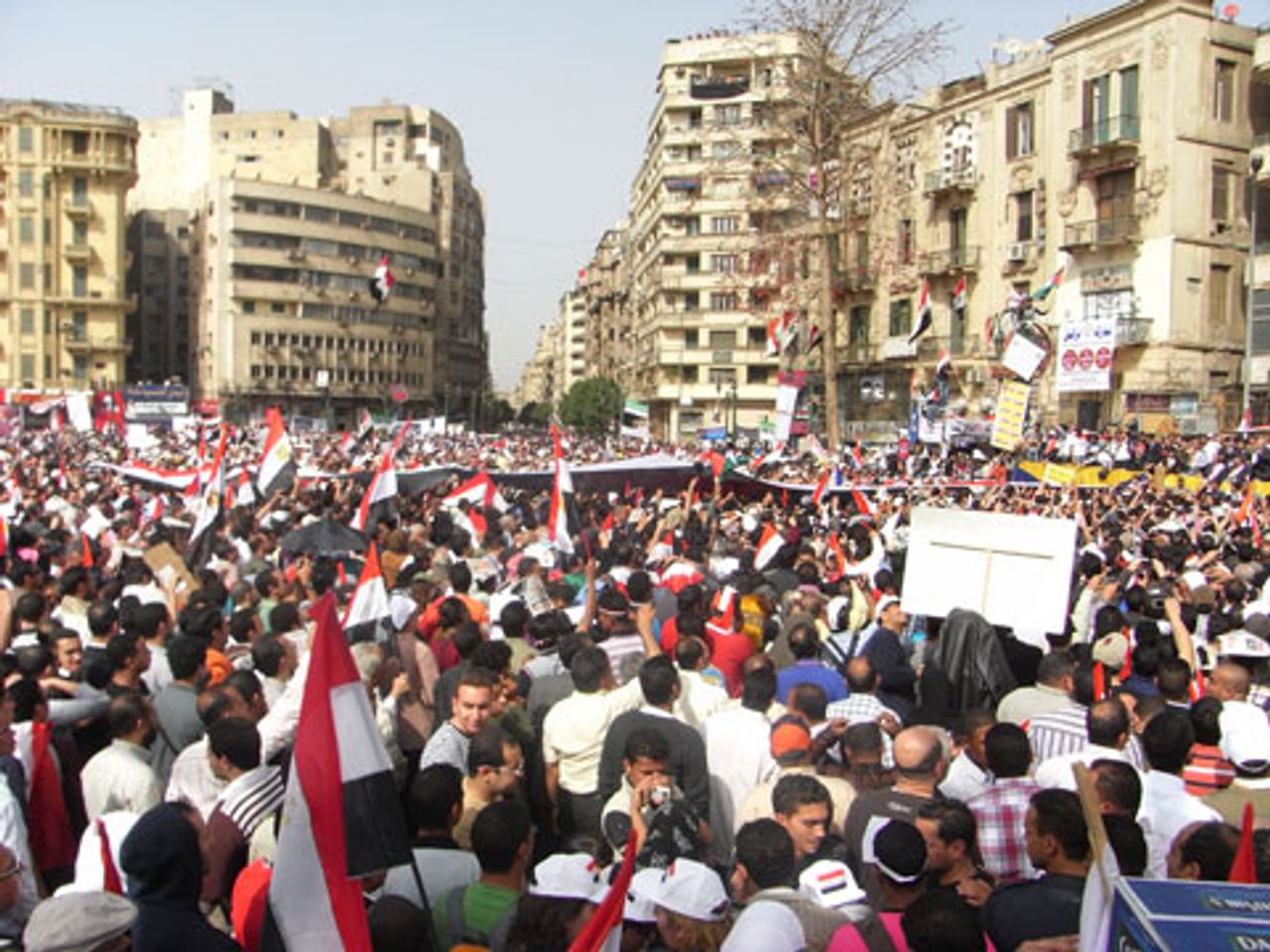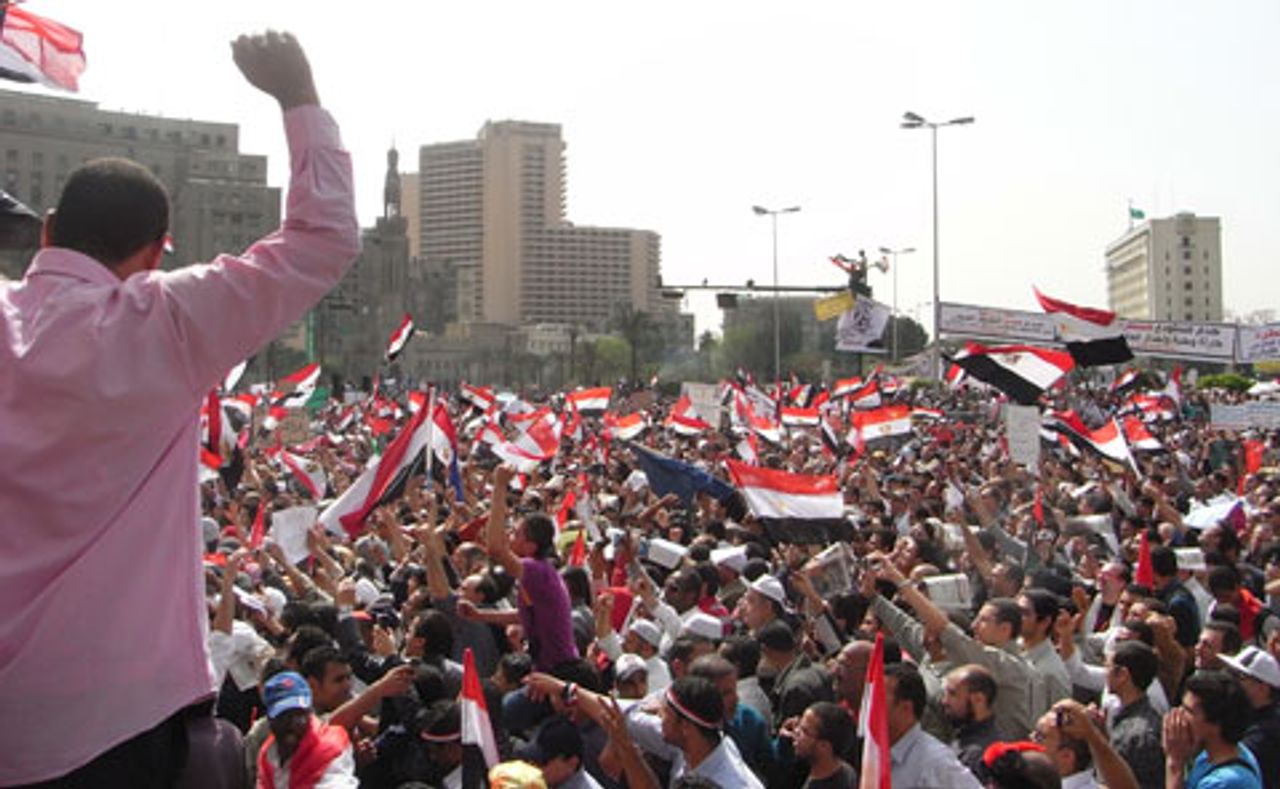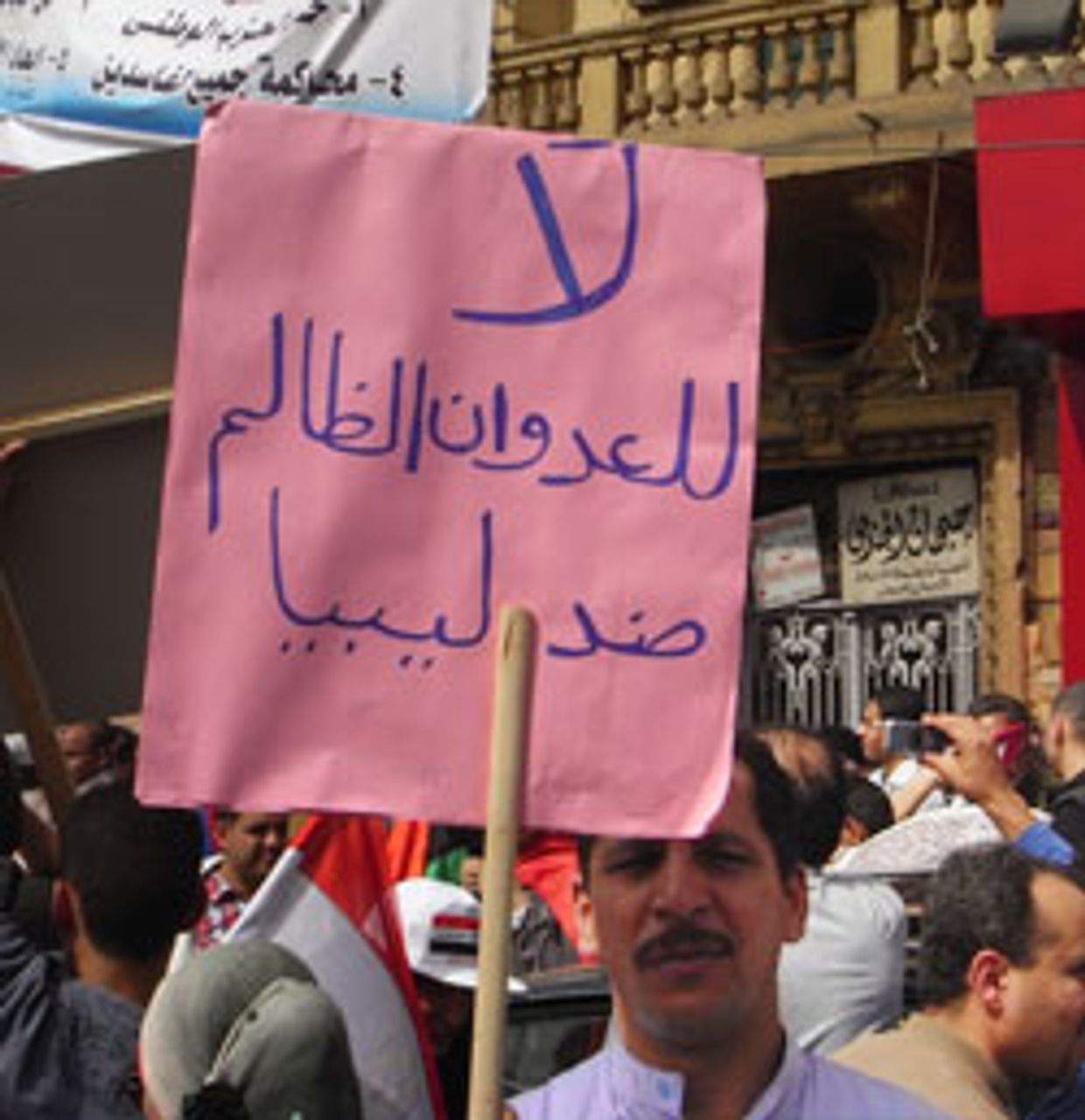 The demonstration in Tahrir Square on Friday
The demonstration in Tahrir Square on FridayOn Friday, tens of thousands took to the streets all over Egypt to demonstrate against recent political developments and call for a continuation of the revolution. An estimated 100,000 protesters assembled in Tahrir Square, the heart of the Egyptian revolution. In Alexandria, more than 10,000 people marched through the city centre. Demonstrations also took place in many parts of the port city of Suez.
Designated “Save the Revolution Day”, the protest expressed enormous popular anger at the openly counter-revolutionary policies of the military junta under Field Marshal Mohamed Hussein Tantawi and Prime Minister Essam Sharaf.
In recent weeks, the new regime has increasingly demonstrated that it is just as hostile to the Egyptian people’s democratic and social rights as was the ex-dictator, Hosni Mubarak, throughout his 30-year rule. Under Tantawi’s leadership, the military on March 23 banned all strikes and protests that interfere with the economy or public life, imposing draconian punishment for those who defy the law. The emergency laws—in force in Egypt since 1967 except for a short period prior to the assassination of Anwar Sadat—will remain in place.
 A scene from Tahrir Square
A scene from Tahrir SquareShortly after announcing the anti-strike legislation, the military regime showed it was determined to implement the policy by brutally dispersing a students’ sit-in at Cairo University. According to eyewitness accounts, soldiers attacked students with electric batons and arrested many.
Hundreds have been arrested, hauled before military courts and sentenced to prison since the military junta assumed power. These include peacefully protesting demonstrators, arrested during the violent clearing of Tahrir Square on March 9. Some of them are said to have been tortured in the Egyptian Museum beforehand. According to reports from Amnesty International, women were subjected to “virginity tests” after soldiers had beaten and tormented them with electric shocks.
The brutality of the new regime has failed to rouse even the slightest criticism from Western politicians, who now rally around the military to ensure the protection of their economic and political interests in Egypt. The Obama administration in the US and the other major powers are backing the military’s new measures for exactly this reason. On the day the repressive anti-strike law was proclaimed, US Defence Secretary Robert Gates visited Cairo to declare his support for the military junta and discuss the ongoing US-led war in neighboring Libya. A few days earlier, Secretary of State Hillary Clinton paid her respects to the military.
 Sign reads: “No to the unjustified
Sign reads: “No to the unjustifiedaggression against Libya”
Assured of the backing of US imperialism, the military council enacted an interim constitution last Wednesday, making clear that the military intends to exercise all its dictatorial powers to retain governmental office until the next presidential elections. The constitution contains 62 articles and is mostly a rehash of the thoroughly undemocratic constitution of 1971.
Only nine of the constitution articles were submitted in advance to the people for their assent in a referendum—a travesty of basic democratic principles. Prior to the vote, however, the military had already announced the interim constitution by decree, bypassing the plebiscite.
The controversial Article No. 2 of the old constitution, declaring Egypt an Islamic state and establishing Sharia law as the basis for all legislation, was carried over unchanged.
The military has thus ensured the support of Islamic forces like the Muslim Brotherhood and Salafi groups. The Islamic forces and the National Democratic Party (NDP), Mubarak’s old ruling party, are the only elements supporting the interim constitution and calling for its acceptance in a referendum. Outside the NDP, the Muslim Brotherhood is the biggest and most organised political force in Egypt. It is becoming more and more useful to the military in efforts to end the protests.
This strategy of the junta has the full support of Washington. John Kerry, former presidential candidate and chairman of the US Senate Foreign Relations Committee, stressed during his visit to Cairo in March that the US was not worried about a seizure of power by the Muslim Brotherhood. Addressing a group of students, he said that most Egyptians wanted “stability”, and it was solely in the hands of Egyptians to make their own decision in the coming elections.
He then candidly admitted that US foreign policy was concerned with defending the country’s interests, including access to oil. Referring to the former dictator, Mubarak, he added: “He was very useful to us on many issues like peace and relations within the region. It wasn’t easy to say suddenly: it’s enough, leave”.
The US’s subsequent rapprochement with the Muslim Brotherhood once again exposes the utter cynicism of US foreign policy. For decades, unconditional support for the dictator, Hosni Mubarak, was primarily justified with the argument that his rule was a guarantee against the growth of Islamism in the region. Now that the revolutionary movement of workers and youth has swept away the Mubarak regime, the US has no qualms about relying on the Islamists to curtail the revolution and defend US strategic interests in the region.
The history of the Muslim Brotherhood has demonstrated that it also has quite willing to subordinate itself to the interests of imperialism. It has consistently cooperated with the imperialists and the ruling government in Egypt when confronted with a powerful upsurge of the working class.
Already in the first days after the Mubarak’s fall, leading representatives of the Brotherhood made it clear that all their seemingly radical positions were negotiable. Regarding the peace treaty between Egypt and Israel, a key cornerstone of US policy in the Middle East, Essam al Erian, speaking for the Muslim Brotherhood, told the Al Arabia television channel: “The Brotherhood will not impose their vision on the Egyptian people. The Brotherhood are part of society that accepts what the Egyptians accept and nobody can wipe out a treaty with a pen”.
What Al Erian failed to mention is that the great majority of the Egyptian population opposes the peace treaty with Israel and opposes US imperialism. Al Erian’s statement simply shows that the Muslim Brotherhood does not represent the interests of the Egyptian masses, but rather those of a section of the Egyptian bourgeoisie that is increasingly hostile to the aspirations of the revolution.
In view of this, it was not surprising that the presence of the Muslim Brotherhood in Friday’s protest was negligible. The protesters were mostly workers and young people, expressing their demands with countless homemade placards. Among the demands were calls for the immediate repeal of the anti-strike law and the interim constitution, the prosecution of all major figures in the old regime, the abolition of the NDP, a redistribution of wealth, and dismissal of the military council.
“Tantawi and all the other representatives of the Mubarak regime should go immediately”, a young protester told the WSWS. He went on to say: “This is the demand of the revolution. From the beginning, our slogan has always been: ‘The people want the overthrow of the regime’. But the regime is still in power; only a few heads at the top have been removed. Tantawi stands for the old system more than any of them. He was defence minister under Mubarak for 20 years, and he was in the US at the outbreak of the revolution”.
Students at Ain Shams University also stressed the necessity of completely ridding Egypt of the old system. People like Hosni Mubarak and other leading figures in the NDP such as Ahmed Nazif (former prime minister), Safwat El Sheriff (former general secretary of the NDP) and Zakaria Azmy (head of the presidential staff) had to be brought to justice without delay, they said. Developments over recent weeks, especially the anti-strike law, were absolutely “illegitimate” and a step back to the time before the revolution, the students claimed. One of them, Mohamed, reported that the military followed up their savagery at Cairo University by also violently attacking students at Ain Shams.
Another protester said, “Actually, the new regime is still the old one. Nothing has changed as far as the country’s foreign and domestic policies are concerned. No moves have even been made to close down gas exports to Israel. The revolution must go on”.
The mass protests on Friday have shown that broad layers of Egyptian workers and youth remain defiant in their opposition to the counter-revolutionary measures of the military and their imperialist backers.
Nationwide strikes broke out again last week despite the new law. On Wednesday, more than 1,000 employees of the housing ministry demonstrated for higher wages. Having laboured under uncertain conditions of employment for more than 20 years, hundreds of temporary workers at the Suez Canal Authority staged a protest to secure fixed contracts. Workers in Beheira, a province in the northwestern Nile Delta, also began a hunger strike on Wednesday. They are demanding medical care, rent subsidies and increased bonuses. According to a report in the independent daily newspaper Al Masry Al Youm, similar protests also took place in the provinces of Al Wadi Al Gadid, southern Sinai and Damietta.
If the labour disputes are to end in success and the revolution is to continue, it is vitally necessary for Egyptian workers and youth to build new mass organisations, independent of bourgeois forces, based on an international, socialist programme. Events following the overthrow of Hosni Mubarak have shown that it is impossible to implement a single social or democratic demand of the Egyptian masses within the framework of the capitalist system or through the agency of Egypt’s official political forces.
